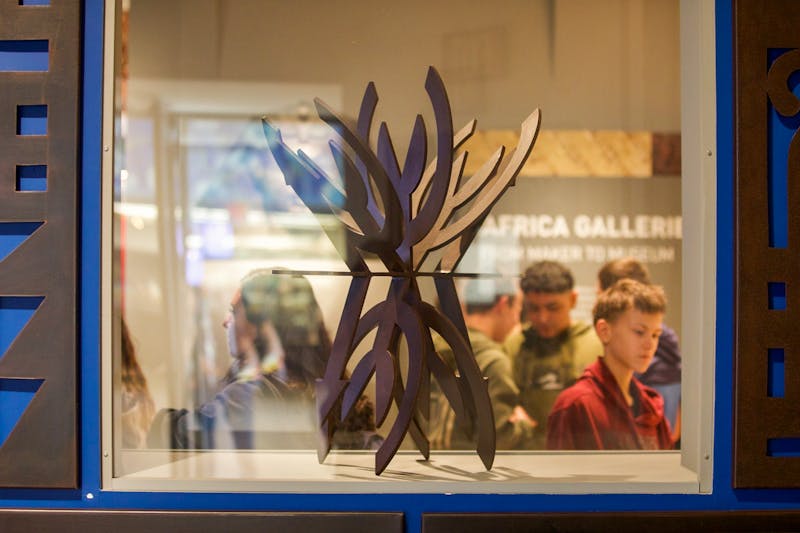
As the Russian invasion of Ukraine continues, Penn students from Ukraine are worried about the safety of their families and the future of their home — and the Penn community is rallying to support them.
On Feb. 24, Russian President Vladimir Putin ordered Russian forces to invade Ukraine. As Russian rockets, bombs, and soldiers continue to attack Ukrainian military and citizens, Penn students who have family in Ukraine told The Daily Pennsylvanian that their families are conflicted about whether to stay at home or seek asylum in neighboring countries.
College first year Olga Loiek grew up in Kolomyia, a city in western Ukraine. She said she worries for her family’s safety who have decided to stay at home in Ukraine.
“I’m not even sure when I’m going to see my family again,” Loiek said. “My family is currently okay, but they can hear the Russian planes that are flying [in] our sky, and they’re waking up at 5:00 a.m. scared for their lives because at any moment, [the Russians] could just bomb a random house, which is very possible.”
While conflict has been ongoing between Ukraine and Russia, Loiek said she and her family never imagined their country would experience war.
“We assumed war would never come to us and never thought that Putin [was] going to be this slaughterous and bomb civilian houses,” Loiek said.
Wharton and Nursing sophomore Max Potlov grew up in Odesa, one of Ukraine’s most populated cities. He said he is concerned about his family’s safety because they experienced military threats close to their home.
“My family can hear some bombs, and there was a missile five miles away from my house, and you can feel it. It’s like a little earthquake,” Potlov said.
While speaking to his family, Potlov said he found out that his father, who he said is an honorably discharged officer in the Ukrainian military, may be drafted into the war.
“Any day, I can wake up and call my Dad, and he might not pick up,” Potlov said.
Potlov said that if conditions become more dangerous, his mother and grandmother will join the hundreds of thousands of other people leaving Ukraine, which has become very difficult due to the mass exodus, according to reports from The Washington Post.
College junior Elena Tisnovsky, who identifies as Ukrainian American, helped organize the Penn and Drexel Solidarity March on Feb. 28, giving Ukrainian and other Eastern European students a platform to raise awareness of the violence occurring in Ukraine.
“There’s much better and more concrete action that you can take as an individual, as an American, than just posting a hashtag or posting a story [that says] ‘Praying for Ukraine,’” Tisnovsky said. “We don’t really need prayers right now; we need action.”
Some Russian students at Penn have also expressed opposition against Russia’s invasion. College first year Daniel Shevchenko, who identifies as Russian American, said he finds Putin’s actions a poor representation of Russia as a nation.
“It’s horrible and an event that is just full of shame for our entire country. There’s nothing positive about the conflict, and I would say most of the Russian population, including my family, shares that opinion,” Shevchenko said.
Kimberly St. Julian Varnon, a Penn doctoral student specializing in Soviet and Eastern European history, is using her Twitter account to update on the conflict and detail the Black experience in Russia and Eastern Europe.
Varnon said that Black Ukrainians are currently facing racism at Ukraine’s borders.
“Race is definitely involved in not allowing Black families to be in the front of the line,” Varnon said.
Varnon added that African visa holders in Ukraine are also facing difficulties in leaving the country.
“Poland has its own visa [process] with African countries, so they’ve opened the border to Ukrainians, but if you do not have a Ukrainian passport or Ukrainian ID, then you have to deal with the laws that have been established between your country and Poland.”
Varnon further emphasized how what is happening in Ukraine impacts the rest of the world, specifically America.
“We have to care because nothing that happens between Ukraine will stay in Ukraine,” Varnon said. She explained that Russia’s use of online misinformation could pose a threat to world order.
Mitchell Orenstein, Penn professor and department chair of Russian and East European Studies, predicts that Putin’s invasion will likely fail and could lead to Putin’s own expulsion from power.
“I think that the outcome of [the invasion] is more likely to result in Putin’s ouster from power than it is to result in him completely subduing the Ukrainian nation," Orenstein said. "If he leaves power, it will not be because of popular action entirely, but it would be more because of elite action."
On Feb. 28, the Vice Provost for University Life Mamta Accapadi and Vice Provost for Global Initiatives Ezekiel Emanuel sent an email to Penn students expressing the University's “condemnation of the violence in Ukraine and [its] solidarity with those who are suffering as a result of the incursion.”
Penn Abroad currently has no students in Ukraine or Russia, but wrote to the DP that they are “monitor[ing] the current situation in Ukraine” and “check[ing] in with all spring 2022 students currently abroad.”
Tisnovsky said there are still many ways to support the Ukrainian government and citizens, including donating to Ukrainian organizations and writing to United States representatives to increase aid to Ukraine. College and Wharton senior Artem Palyanychko has compiled a list of charitable organizations that provide help on the ground in Ukraine.
“We really need support from the West,” Loiek further expressed. “Please help Ukrainian people and find a way to donate something. Even the smallest contribution can add up and save someone’s life.”
The Daily Pennsylvanian is an independent, student-run newspaper. Please consider making a donation to support the coverage that shapes the University. Your generosity ensures a future of strong journalism at Penn.
Donate






